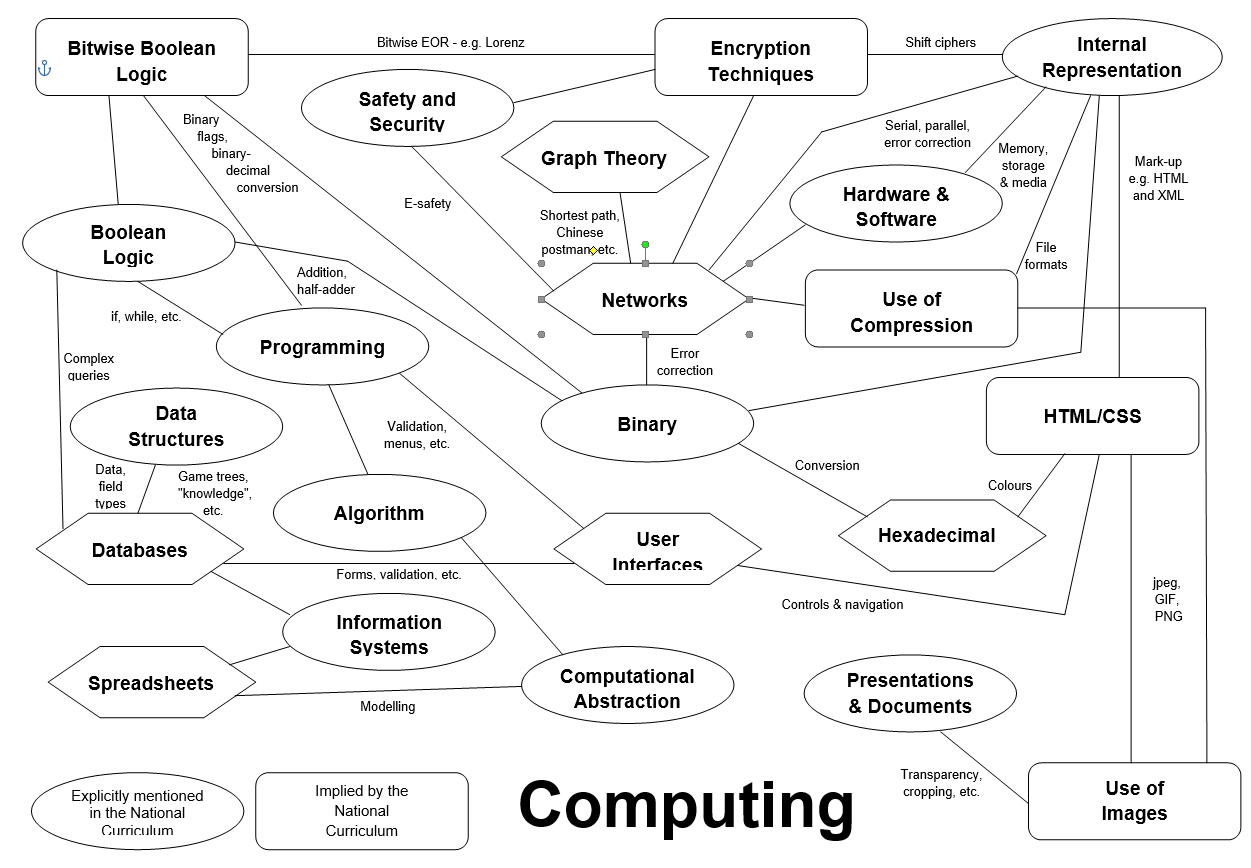COMPUTING
COMPUTING
The subject leader is Mr Stuart Cook
Assessing Pupils' Progress 9-1:
GCSE Exam Specification
https://www.aqa.org.uk/subjects/computer-science-and-it/gcse/computer-science-8525/subject-content
Internet Safety
https://learning.nspcc.org.uk/research-resources/schools/e-safety-for-schools
Child Exploitation & Online Protection Centre
BRITISH VALUES
Democracy
KS3 - Pupils are encouraged to make their own choices when using digital technologies, but at the same time to respond appropriately to the laws and legislations relating to on and off-line use. Pupils are encouraged to voice their own opinions but at the same time to respect the opinions of others, which may not be the same as theirs. Pupils are taught the meaning of bias and opinion and how this relates to information received, used and given, particularly on line.
KS4 - Pupils are encouraged to make their own choices when using digital technologies, but at the same time to respond appropriately to the laws and legislations relating to on and off-line use. Pupils are encouraged to voice their own opinions but at the same time to respect the opinions of others, which may not be the same as theirs.
The rule of law
KS3 - Pupils are taught good working practices when using digital technologies at home and at school. Laws and legislation relating to computer and internet use are discussed and pupils are made aware of their responsibilities when using these technologies. This is further expanded to include laws and legislation (both formal and informal) relating to bullying, cyber bullying and discrimination.
KS4 - Pupils are taught the important of good working practices when using digital technologies at home and at school. Laws and legislation relating to computer and internet use are discussed and pupils are made aware of their responsibilities when using these technology. This is further expanded to include laws and legislation (both formal and informal) relating to bullying, cyber bullying and discrimination.
Individual liberty
KS3 - Pupils are encouraged to develop their own ideas yet retain responsibility in what they do, both on and off line. Pupils are supported in developing skills which extend beyond the work undertaken in the classroom to allow them to develop their own work and skills at home/future education/careers. However, we aim to develop the culture of what is “right” and what is “wrong” when using technology (for example illegal downloading, inappropriate images, anti-social chatrooms etc).
KS4 - Pupils are encouraged to develop their own ideas yet retain responsibility in what they do, both on and off line. Pupils are supported in developing skills which extend beyond the work undertaken in the classroom to allow them to develop their own work and skills at home/future education/careers. However, we aim to develop the culture of what is “right” and what is “wrong” when using technology (for example illegal downloading, inappropriate images, anti-social chatrooms etc). Pupils are also encouraged to consider their use of digital technologies and to look at their own digital footprint and the impact that this may or may not have on themselves and others.
Mutual respect
KS3 - Mutual respect is encouraged when dealing with other people, particularly on-line. Pupils are made aware of the need to be respectful, tolerant and non-biased when dealing with other people. We encourage pupils to develop their communication skills in working with different types of people, but also encourage them to do this safely and appropriately.
KS4 - Mutual respect is encouraged when dealing with other people, particularly on-line. Pupils are made aware of the need to be respectful, tolerant and non-biased when dealing with other people. We encourage pupils to develop their communication skills in working with different types of people, but also encourage them to do this safely and appropriately.
Tolerance of those of different faiths and beliefs
KS3 - Pupils are encouraged to develop respect for other people through their use of technologies. Pupils are also made aware of their own digital footprints to enable them to foster respect of their own online input.
KS4 - Pupils are encouraged to develop respect for other people through their use of technologies both in and out of school. Pupils look to developing their communication skills and develop good working practices when using technology through different media.
KEY STAGE 3 COMPUTING
Currently a two year KS3 moving to a three year KS3 in 2023-2024.
The study of computing ensures that students are prepared to be active participants in a digital world, through developing a comprehensive digital literacy. Through computing, students will gain the ability to use information systems and coding to express themselves, develop their ideas and collaborate in ways that support the future workplace.
Our KS3 computing curriculum aims to develop students’ computational thinking and creativity through studying:
- The principles of information and computation
- How digital systems work
- Logic, coding, and programming languages
Building on this knowledge and understanding, students will be equipped to use information technology to code, develop systems and create content through:
- Applying the fundamental principles and concepts of computer science, including abstraction, logic, algorithms, and data representation
- Analysing problems in computational terms, and writing computer programs in order to solve such problems
- Evaluating and applying information technology, including new or unfamiliar technologies, analytically to solve problems
Our teaching privileges the knowledge and skills students need to become creators rather than simply consumers of digital products and services. We forge deep knowledge links with disciplines such as mathematics, science, and technology. We value the responsible, competent, confident, and creative use of information and communication technology.

KEY STAGE 4 COMPUTING
We offer computer science at GCSE and follow the AQA exam syllabus.
KS4 REVISION RESOURCES
Computer Science
https://www.knowitallninja.com/the-best-gcse-computer-science-revision-websites/
https://teachcomputerscience.com/
https://studyrocket.co.uk/revision/gcse-computer-science-aqa
AQA GCSE Computer Science Student's Book
ISBN-10: 1444182269 or ISBN-13: 978-1444182262
Websites:
Edexcel
USEFUL WEBSITES

